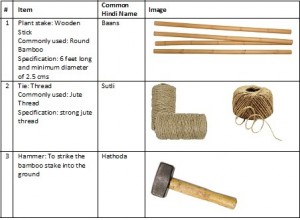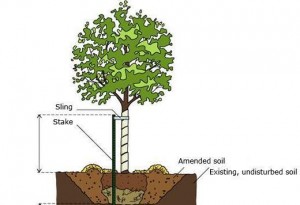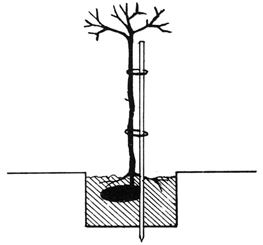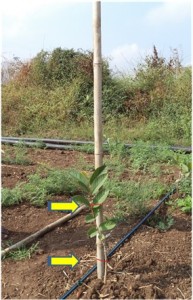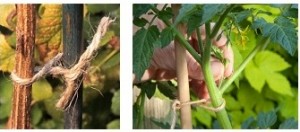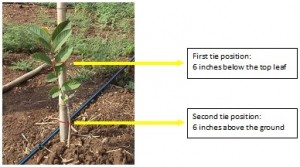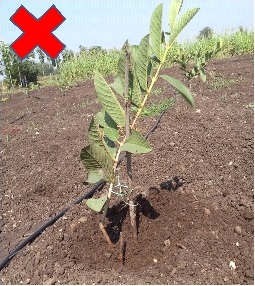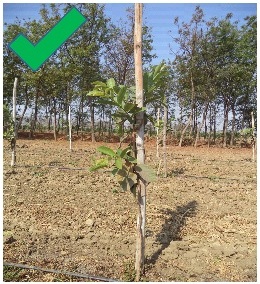Staking in VNR Bihi Guava Plants
VNR Bihi Guava plants in early stage achieve strong growth that makes them vulnerable to collapse, especially due to strong winds or after heavy rains. Staking them in early planting stage will help avoid such disasters. As a standard practice and in particular; plants with steady growth require additional support.
Why to stake VNR Bihi Guava plants
Staking in VNR Bihi is recommended for various reasons –
- VNR Bihi plants during initial stage has tall brittle stems with grafting nod, they can be damaged by strong winds
- Clumps of early stage plant can split and toss on the ground in bad weather or under the weight of their own growing branches
Benefits of Staking in VNR Bihi Guava Plants
Staking helps in keeping the VNR Bihi plant straight. As direct benefit, it also helps in preventing the plant from damage due to strong, high speed winds during storms or otherwise.
When to stake VNR Bihi Guava plants
Staking in VNR Bihi needs to be done on the same day, when plantation is undertaken in the Grower’s field or orchard. Staking at early stage, helps VNR Bihi plant to get proper support during its vegetative growth period.
Duration/Period of Staking
VNR Bihi plants needs to be given staking support till it attains 2 years of age
Things required for staking in VNR Bihi Guava Plants
Difficulty level in Staking of VNR Bihi Guava Plants
Easy to Moderate
Sequential steps
Step 1: Take a bamboo stake of 6 feet length
Step 2: Strike staking bamboo next to stem of VNR Bihi plant. Keep a distance of 2 inches from the stem of the plant. Place the stake at an angle to offer additional support to the plant.
Step 3: Ensure that bamboo stake is penetrated 1 feet below the ground
Step 4: Tie Jute thread i.e. Sutli at 2 locations in the plant, First at 6 inches above the ground and Second at 6 inches below the top leaf of the plant
Actual Picture Representation of Staking in VNR Bihi Guava Plant
Important points and precautions in VNR Bihi Guava plant staking
Size of Bamboo Stake: Use a bamboo stake of 6 feet length and 2.5 inches diameter
Reasoning: Staking is to be done for a long period i.e. 2 years of plant age therefore, if Grower uses a small bamboo of 2 or 3 feet than he will have to replace it with in next 6 to 8 months for a longer stake. This will incur an additional effort of labour and stake costs. To avoid this expenditure of additional labour and bamboo costs, it’s advised to use a 6 feet length of stake in first stage itself.
Bamboo stake penetration: Take care
While penetrating bamboo stake next to stem of the plant ensure that it’s not too far from the stem and also it’s not too close to the stem that it damages the underground main root structure of the plant. Make sure to avoid the roots when striking the stake into the ground. Hitting on the roots may injure or even kill the plant.
Bamboo Health or Condition: Need not be infected
Ensure that bamboo stake is weathered properly and is not infected with termite etc. If required treat it with requisite pesticide. To increase bamboo’s life in wet conditions, it can be dipped and dried in bitumen or tarkol.
Tie for staking: Use of Jute thread (Sutli). Do not use nylon and/or metal wire
Reasoning: Plant stems are tender and will get damaged / cut due to sharp edges of nylon and metal wires, that is why it’s advisable to use soft jute (sutli) threads which gets weathered and does not get damage in sun heat. Nylon thread brittles in sun heat and metal wire gets rusted in rain
Do not Tie Rigidly: Tight tying will rub the plant stem with bamboo stake and damage it
Don’t tie in plants too rigidly; they should be able to move in the wind. When tying in individual stems, use a figure-of-eight technique so the string passes between the stem and the bamboo to prevent rubbing
Figure-of-eight technique is used in tying to prevent rubbing of plant against stake and avoid damaging.
Figure-of-eight knot in staking of VNR Bihi Guava plant
Actual Pictorial Representation
Tying at 2 places: At 2 specific intervals
Tying off plant may seem like a lot of work, but it is necessary to help the plants thrive. Without the ties, the plants may bend over, become covered in mud, or snap off and die. Tying at 2 places help plant to stand firm and sturdy, does not allow it to bend.
Staking –What can go wrong?
Staking with weak and small stake–is not a staking at all..!!
Correct Staking in VNR Bihi Guava Plant
Staking with 2.5 inches diameter and 6 feet bamboo gives proper support to plant for initial growth
Care of staked plants
Check regularly on Bamboo stake: Ensure that bamboo stake is grounded firmly in soil and is not tilted too much. Ensure that it keeps giving proper support to plant.
Change of tie position at regular intervals: When the plant achieves growth and its height increases, the position of tie needs to be changed. Remember, First tie needs to be fixed again at 6 inches distance from top leaf of the plant.
Check on VNR Bihi Guava plants regularly, and apply additional ties when the plant grows: Add ties about 6 to 8 inches (15.2 to 20.3 cm) apart. Make sure to secure the tie to the bamboo stake and not the plant. All of the branches may be gathered at a single stake near the plant’s centre to provide additional support.

